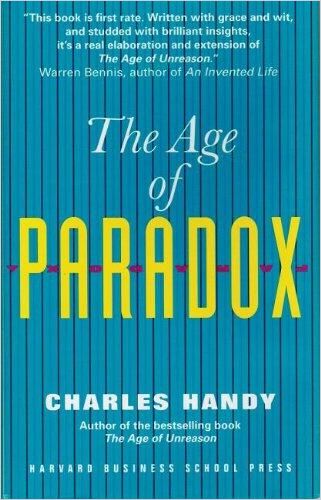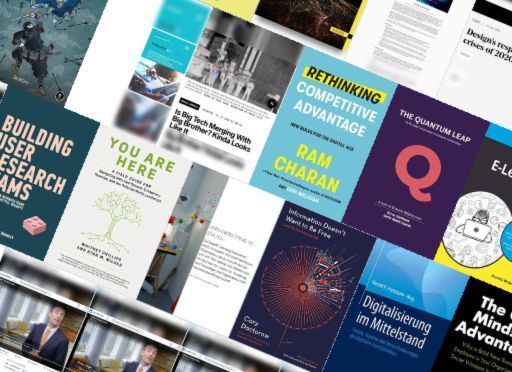Management consultant Charles Handy offers a clear path for dealing with today’s myriad and murky paradoxes.

Accept Paradoxes and Thrive
Author of the best-selling The Age of Unreason, published in 1989, Charles Handy was a management consultant and philosopher who taught at MIT and London Business Schools. Age of Paradox, his 1994 classic, remains a wise guide to tumultuous change. In it, Handy offered a prescient account of the challenges that communities, businesses and countries face. He provides clear insights and recommendations on every page.
Unlike management authors who are keen to make everything sensible, in this book Handy recommends accepting the conflicts of today’s paradoxes and working with them rather than trying to make them go away. If you feel beset by economic, political and social decisions from your past, Handy’s text helps you cut through the morass to break new ground. While his ideas are complex, his language – while not exactly simple – is neither difficult nor obscuring. Handy’s thoughts are helpful for everyone who wants to think through problems and find new ways of working.
Moral Considerations
Handy warns that in the 15 years before 1989, the United States added 32 million new jobs – mostly low-wage work offering no hope for advancement. Work was once a place people went every day, not what they did with their lives.
Paradoxes are like the weather, something to be lived with, not solved.Charles Handy
In Handy’s analysis, buying and consuming goods became a reference point for success, which led to a society structured around envy and desire. The author cites Adam Smith, author of The Wealth of Nations, as a moral philosopher who held that the whole society needs to exercise moral consideration.
Understanding Paradoxes
Handy arrays a variety of issues as twinned paradoxes. He holds that the “paradox of intelligence” recognizes that knowledge, while intangible, is the newest form of property. The “paradox of work” addresses how some people have work and income but no rest, while others have time off but no work or income. His “paradox of productivity” suggests that because business efficiency eliminated jobs, people must perform work they once paid others to do. The “paradox of time” reveals that some people have work and no time and others have time and no work.
Handy’s “paradox of riches” sadly acknowledges that economic growth relies on more people wanting more things. The “paradox of organizations” explicates that to succeed, organizations need global reach and local attachment. According to Handy’s “paradox of aging,” every generation uses structures that served the last generation while producing changes that serve themselves, but not the next generation. His “paradox of justice” recognizes that capitalism claims that those who work hardest should get the most, and so, he worries, capitalist societies ignore those who need the most. The “paradox of success,” Handy concludes, demands letting go of old ways so you can launch the next thing. He understands that the path that gets you to success won’t maintain it.
Big and Small
Handy details how small groups move more quickly, concentrate more intently, shift course more easily and experience greater joy, but larger groups reap the benefit of economies of scale.
Under what Handy calls “reverse delegation,” smaller units relinquish some responsibilities and power to the center because – operating as a collective on behalf of the smaller units – the center performs those tasks better. He cites Silicon Valley organizations as having this multipolar attribute: Divisions work on their tasks while the center manages the strategic vision that unites them. For Handy, this is the near-perfect way to run a business.
More than Profit
Handy’s philosophy always underscores the need for human scale. He insists that groups need to be sufficiently small for people to know and trust each other. He maintains that people must work with a team long enough to show their work and get feedback. Handy can be ruthless in the quest for a well-performing team. When members don’t live up to their responsibilities and their community, he is adamant that they must go.
To say that profit is a means to other ends and not an end in itself is not a semantic quibble, it is a serious moral point.Charles Handy
Growth, he suggests, can focus on quality and improvement instead of profit. When businesses prioritize shareholder value, Handy believes they diminish the opportunity to invest in themselves. He points out that Japanese and German companies keep around 65% of their profits for reinvesting in their business to help it grow and improve, while American and British companies keep only 54% and 45% respectively.
A Better World
Knowledge work makes a value out of intelligence, which Handy posits is a form of property. He makes the case that intelligence manifests in different forms: “factual, analytic, linguistic, spatial, musical, practical, physical, intuitive and interpersonal.” Ideally, Handy thinks, schools should help students identify their intelligence, and teach them to cultivate it.
Embrace Productive Irrationality
Handy sums up his theme: The paradoxes that people and businesses face demand new ways of thinking. His The Age of Unreason championed unreasonable people who makes the world bend to them. Here, he laments how the world – with its new demands for constant work and constant access – bends humanity to its purposes. Handy doesn’t as much demand that you get off the merry-go-round – he recognizes that only the super-wealthy can do that – as he entreats you to be mindful of the processes that surround you and in which you are immersed.
He argues persuasively that this mindfulness begins and ends with embracing precisely what today’s world least nourishes but always practices: irrationality. Let the multi-leveled, paradoxical aspects of existence today become normal, Handy urges, and you will retain your precious sanity and humanity.











